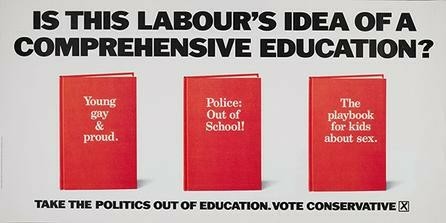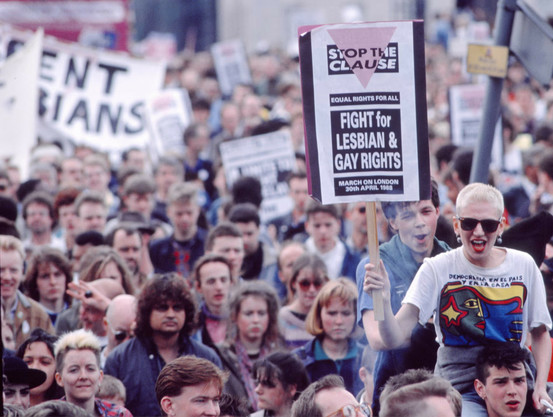Recent searches
Search options
In May 1988, legislation passed in the UK "prohibiting the promotion of homosexuality" by local authorities. It was in effect for a decade and a half, with massive impact on the LGBT+ community. This is a brief history of Section 28.
In 1980s Britain, homophobia was rising. This was in part due to increasing visibility of LGBT+ people as laws criminalising homosexual sex were repealed, in part due to the AIDS epidemic, and in part due to joint activism between miners' unions and LGBT+ groups.
Spurious stories began appearing in the media regarding various texts said to be read in schools. Many of the books referenced were fairly banal, and also weren't present in schools.
Nevertheless, the governing Conservative party leaned into the moral panic, repeating spurious stories. Prime Minister Margaret Thatcher said "Children who need to be taught to respect traditional moral values are being taught that they have an inalienable right to be gay. All of those children are being cheated of a sound start in life."
The 1987 general election included Conservatives making all sorts of unevidenced claims, such as that five year olds were being taught about the specifics of how two men had sex (they weren't). Attack posters about homosexuality were used, too.
1987 election poster designed by
Saatchi & Saatchi for the Conservative Party. Courtesy of Conservative Party Archive.
The Conservatives won the election by a landslide, and felt they had the mandate to begin enacting their rhetoric. In their Local Government Act of 1988, they included Section 28, a provision which amended a previous Act to include:
(1) A local authority shall not—
(a) intentionally promote homosexuality or publish material with the intention of promoting homosexuality;
(b) promote the teaching in any maintained school of the acceptability of homosexuality as a pretended family relationship.
There was campaigning from many groups before the legislation was passed. The wording of Section 28 was ultimately tempered due to interventions from the arts sector, who were concerned about broader arts censorship; and specific exemptions for health were included.
The main opposition party, Labour, initially did not oppose the legislation, but changed their course when their rivals, the Liberal Democrats, came out against it.
The LGBT+ community mobilised in opposition to Section 28. Actor Sir Ian McKellan came out in a radio interview in response. Lesbians invaded a BBC news broadcast, chaining themselves to desks and sitting on chairs to make themselves heard. Marches took place across the country.
Image: London march in April 1988, Rick Colls/Rex/Shutterstock
@vagina_museum
the banner at the back says "BENT LESBIANS"?
@floppyplopper @vagina_museum It’s a protest in London, so I’m going to stick my neck out and guess that it says “Brent Lesbians.”
@etikemik @vagina_museum
let's hear it for Brent Lesbians
@floppyplopper @etikemik @vagina_museum This is so oddly specific, and yet it's a demographic I can say I know and work with.
@spacehobo @floppyplopper @etikemik @vagina_museum yeah, same, big fan of the old guard Brent lesbians
@stavvers @floppyplopper @etikemik @vagina_museum Did you know they have an Ikea now?



